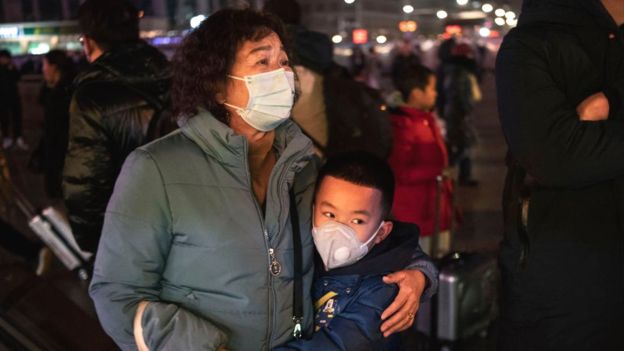Chinese authorities have advised people to stop travel into and out of Wuhan, the city at the centre of a new virus outbreak that has killed nine.
Those living in the city of 8.9 million people have also been told to avoid crowds and minimise public gatherings.
The new virus has spread from Wuhan to several Chinese provinces, as well as the US, Thailand and South Korea.
There are 440 confirmed cases, with the origin a seafood market that "conducted illegal transactions of wild animals".
"Basically, do not go to Wuhan. And those in Wuhan please do not leave the city," said National Health Commission vice-minister Li Bin in one of the first public briefings since the beginning of the outbreak.
Authorities also admitted that the country was now at the "most critical stage" of prevention and control.
China had earlier confirmed that human-to-human transmission of the virus had taken place.
The virus, known also as 2019-nCoV, is understood to be a new strain of coronavirus that has not previously been identified in humans.
Signs of infection include respiratory symptoms, fever, cough, shortness of breath and breathing difficulties.
Mr Li said there was evidence that the disease was "mainly transmitted through the respiratory tract".
But China has still not been able to confirm the exact source of the virus.
"Though the transmission route of the virus is yet to be fully understood, there is a possibility of virus mutation and a risk of further spread of the epidemic," said Mr Li.
He also added that there were 2,197 people who were known to have come into contact with infected patients.
No super spreader - a patient who has transmitted the virus to more than 10 people - has been discovered so far.
At least 15 medical workers in Wuhan, presumably those who came into contact with patients, are known to be infected with the virus.
There's no way to know but it's likely to be exacerbated by the millions of people across China who are travelling within the country for the Lunar New Year week-long holiday. Thousands are also travelling abroad.
Mr Li added that the festival would "increase the risk of the disease spreading and the difficulty of prevention and control".
He said strict measures to control the disease would be put in place, calling for those in Wuhan to "avoid crowds and minimise public gatherings".
These measures include temperature screening for all those leaving Wuhan and improved sterilisation and ventilation at major transport hubs.
A ban on the trade of live poultry and wild animals has also been implemented in the city. State media reports said police were conducting spot checks to make sure this is enforced.
"We already know that the disease originated from a market which conducted illegal transaction of wild animals," said Gao Fu, director of the Chinese Centre for Disease Control and Prevention.
"This might be the cause, so the disease could be on an animal, and then passed on from this animal to a human."
Wuhan's mayor has also called for visitors to stay away from the city if there is no urgent reason to visit.
One of the last major outbreaks in China - the H1N1 pandemic - saw harsh methods employed in an attempt to stem the virus.
In 2009, passengers entering China that were found to have flu-like symptoms were put into isolation for seven days. School children also had their temperature tested and any with a fever were sent home.
Where else have cases been reported?
There have been a handful of global cases: three cases in Thailand, one in Korea, one in Japan, one in Taiwan and one in the US.
On Wednesday, the city of Macau also reported its first confirmed case of the virus. The patient is said to be a businesswoman who had arrived from Wuhan over the weekend.
Authorities in many places, including Australia, Singapore, Hong Kong, Taiwan and Japan have stepped up screening of air passengers from Wuhan. US authorities last week announced similar measures at airports in San Francisco, Los Angeles and New York.
In Australia, a man who had travelled to Wuhan has been placed in isolation and is undergoing tests. China is the largest source of tourists to Australia, with more than one million people visiting last year.
Experts say there could be many cases going undetected, with a report by the MRC Centre for Global Infectious Disease Analysis at Imperial College London suggesting there could be more than 1,700 infections.
However, Mr Fu from the Chinese Centre For Disease Control said the figures predicted by the study were "not in line with what we are seeing in reality".
The World Health Organization (WHO) will on Wednesday consider declaring an international public health emergency over the virus - as it did with swine flu and Ebola.
Such a declaration, if made, will be seen as an urgent call for a co-ordinated international response.
Credit:BBC





